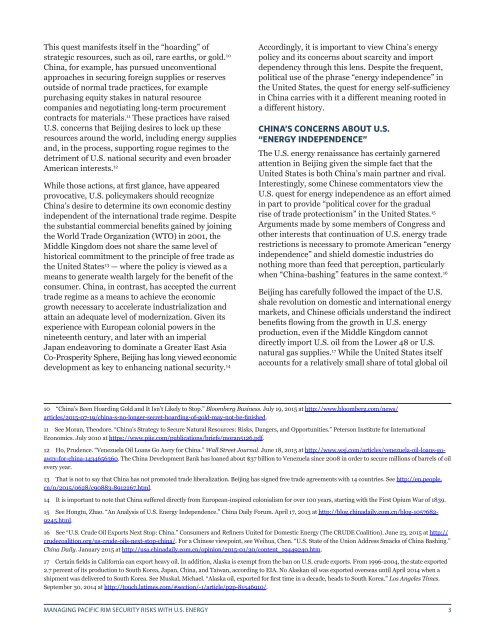Managing Pacific Rim Security Risks With U.S Energy
1WwUZP6
1WwUZP6
Create successful ePaper yourself
Turn your PDF publications into a flip-book with our unique Google optimized e-Paper software.
This quest manifests itself in the “hoarding” of<br />
strategic resources, such as oil, rare earths, or gold. 10<br />
China, for example, has pursued unconventional<br />
approaches in securing foreign supplies or reserves<br />
outside of normal trade practices, for example<br />
purchasing equity stakes in natural resource<br />
companies and negotiating long-term procurement<br />
contracts for materials. 11 These practices have raised<br />
U.S. concerns that Beijing desires to lock up these<br />
resources around the world, including energy supplies<br />
and, in the process, supporting rogue regimes to the<br />
detriment of U.S. national security and even broader<br />
American interests. 12<br />
While those actions, at first glance, have appeared<br />
provocative, U.S. policymakers should recognize<br />
China’s desire to determine its own economic destiny<br />
independent of the international trade regime. Despite<br />
the substantial commercial benefits gained by joining<br />
the World Trade Organization (WTO) in 2001, the<br />
Middle Kingdom does not share the same level of<br />
historical commitment to the principle of free trade as<br />
the United States 13 — where the policy is viewed as a<br />
means to generate wealth largely for the benefit of the<br />
consumer. China, in contrast, has accepted the current<br />
trade regime as a means to achieve the economic<br />
growth necessary to accelerate industrialization and<br />
attain an adequate level of modernization. Given its<br />
experience with European colonial powers in the<br />
nineteenth century, and later with an imperial<br />
Japan endeavoring to dominate a Greater East Asia<br />
Co-Prosperity Sphere, Beijing has long viewed economic<br />
development as key to enhancing national security. 14<br />
Accordingly, it is important to view China’s energy<br />
policy and its concerns about scarcity and import<br />
dependency through this lens. Despite the frequent,<br />
political use of the phrase “energy independence” in<br />
the United States, the quest for energy self-sufficiency<br />
in China carries with it a different meaning rooted in<br />
a different history.<br />
CHINA’S CONCERNS ABOUT U.S.<br />
“ENERGY INDEPENDENCE”<br />
The U.S. energy renaissance has certainly garnered<br />
attention in Beijing given the simple fact that the<br />
United States is both China’s main partner and rival.<br />
Interestingly, some Chinese commentators view the<br />
U.S. quest for energy independence as an effort aimed<br />
in part to provide “political cover for the gradual<br />
rise of trade protectionism” in the United States. 15<br />
Arguments made by some members of Congress and<br />
other interests that continuation of U.S. energy trade<br />
restrictions is necessary to promote American “energy<br />
independence” and shield domestic industries do<br />
nothing more than feed that perception, particularly<br />
when “China-bashing” features in the same context. 16<br />
Beijing has carefully followed the impact of the U.S.<br />
shale revolution on domestic and international energy<br />
markets, and Chinese officials understand the indirect<br />
benefits flowing from the growth in U.S. energy<br />
production, even if the Middle Kingdom cannot<br />
directly import U.S. oil from the Lower 48 or U.S.<br />
natural gas supplies. 17 While the United States itself<br />
accounts for a relatively small share of total global oil<br />
10 “China’s Been Hoarding Gold and It Isn’t Likely to Stop.” Bloomberg Business. July 19, 2015 at http://www.bloomberg.com/news/<br />
articles/2015-07-19/china-s-no-longer-secret-hoarding-of-gold-may-not-be-finished.<br />
11 See Moran, Theodore. “China’s Strategy to Secure Natural Resources: <strong>Risks</strong>, Dangers, and Opportunities.” Peterson Institute for International<br />
Economics. July 2010 at https://www.piie.com/publications/briefs/moran5126.pdf.<br />
12 Ho, Prudence. “Venezuela Oil Loans Go Awry for China.” Wall Street Journal. June 18, 2015 at http://www.wsj.com/articles/venezuela-oil-loans-goawry-for-china-1434656360.<br />
The China Development Bank has loaned about $37 billion to Venezuela since 2008 in order to secure millions of barrels of oil<br />
every year.<br />
13 That is not to say that China has not promoted trade liberalization. Beijing has signed free trade agreements with 14 countries. See http://en.people.<br />
cn/n/2015/0628/c90883-8912267.html.<br />
14 It is important to note that China suffered directly from European-inspired colonialism for over 100 years, starting with the First Opium War of 1839.<br />
15 See Hongtu, Zhao. “An Analysis of U.S. <strong>Energy</strong> Independence.” China Daily Forum. April 17, 2013 at http://blog.chinadaily.com.cn/blog-1057682-<br />
9245.html.<br />
16 See “U.S. Crude Oil Exports Next Stop: China.” Consumers and Refiners United for Domestic <strong>Energy</strong> (The CRUDE Coalition). June 23, 2015 at http://<br />
crudecoalition.org/us-crude-oils-next-stop-china/. For a Chinese viewpoint, see Weihua, Chen. “U.S. State of the Union Address Smacks of China Bashing.”<br />
China Daily. January 2015 at http://usa.chinadaily.com.cn/opinion/2015-01/30/content_19449240.htm.<br />
17 Certain fields in California can export heavy oil. In addition, Alaska is exempt from the ban on U.S. crude exports. From 1996-2004, the state exported<br />
2.7 percent of its production to South Korea, Japan, China, and Taiwan, according to EIA. No Alaskan oil was exported overseas until April 2014 when a<br />
shipment was delivered to South Korea. See Muskal, Michael. “Alaska oil, exported for first time in a decade, heads to South Korea.” Los Angeles Times.<br />
September 30, 2014 at http://touch.latimes.com/#section/-1/article/p2p-81546910/.<br />
MANAGING PACIFIC RIM SECURITY RISKS WITH U.S. ENERGY 3


